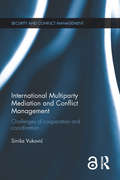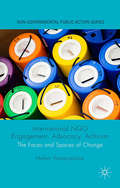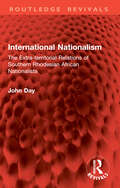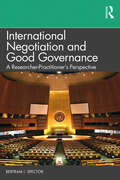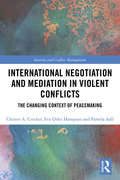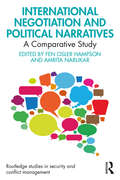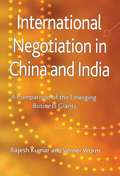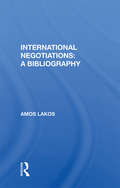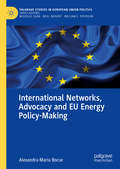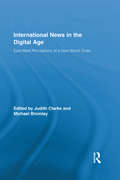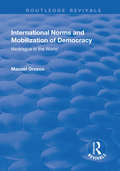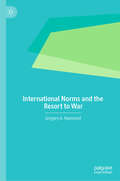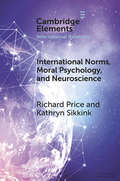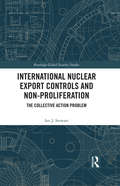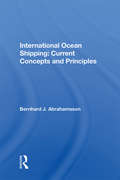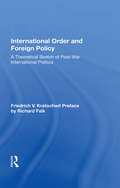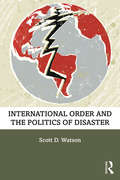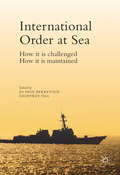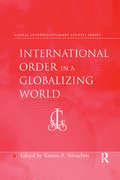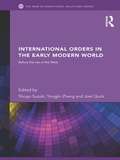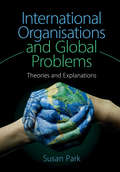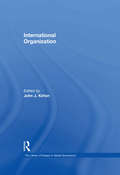- Table View
- List View
International Multiparty Mediation and Conflict Management: Challenges of Cooperation and Coordination (Routledge Studies in Security and Conflict Management)
by Sinisa VukovicThis volume aims to provide a detailed explanation of the effects of cooperation and coordination on international multiparty mediation in conflicts. Contemporary scholarship stresses that the crucial ingredients for a successful multiparty mediation are ‘consistency in interests’ and ‘cooperation and coordination’ between mediators. This book seeks to supplement that understanding by investigating how much the ‘consistency of interests’ and ‘cooperation and coordination’ affect the overall process, and what happens to the mediation process when mediating parties do not share the same idea and interest in finding a common solution. At the same time, it explores the obstacles in achieving coordination and coherence between various mediators in such an environment and how to surmount the problems that multiple mediators face when operating without a ‘common script’ in attempting to mediate a negotiated settlement. The study investigates three distinct mechanisms (both on the systemic and contextual level) that have the potential to deter defection from a (potential) member of the multiparty mediation coalition: geo-political shifts, changes in the conflict dynamics, and mediators’ ability to bargain for a cooperative relationship. As the number of states and international actors that are involved in mediation increases, a careful assessment is necessary not only of their relative institutional strengths and weaknesses, but also of how to promote complementary efforts and how to synchronize the whole process when one actor is transferring the responsibilities for mediation to others. This book will be of much interest to students of mediation, conflict management, war and conflict studies, security studies and IR.
International NGO Engagement, Advocacy, Activism: The Faces and Spaces of Change (Non-Governmental Public Action Series)
by Helen YanacopulosInternational NGO Engagement, Advocacy, Activism.
International NGO Engagement, Advocacy, Activism: The Faces and Spaces of Change (Non-Governmental Public Action)
by Helen YanacopulosThe world of international non-governmental organisations (INGOs) has dramatically changed during the last two decades. The author critically analyses the engagement of INGOs within the contemporary international development landscape, enabling readers to further understand INGOs involvement in the politics of social change.
International Nationalism: The Extra-territorial Relations of Southern Rhodesian African Nationalists (Routledge Revivals)
by John DayFirst published in 1967, International Nationalism discusses the Southern Rhodesian Nationalist Movement and explores how nationalists tried to combine internal with international pressure for self-government. The author provides a well-researched and concise history of various aspects of the Movement—relations with the British government; persuading international institutions; links in Central Africa; headquarters abroad; and the activities of Nkomo—among others. He further explores the relative importance of internal and international activity. A fascinating and scholarly work, this book is a must read for students and researchers of African studies and politics.
International Negotiation
by Ho-Won JeongNegotiation has always been an important alternative to the use of force in managing international disputes. This textbook provides students with the insight and knowledge needed to evaluate how negotiation can produce effective conflict settlement, political change and international policy making. Students are guided through the processes by which actors make decisions, communicate, develop bargaining strategies and explore compatibilities between different positions, while attempting to maximize their own interests. In examining the basic ingredients of negotiation, the book draws together major strands of negotiation theories and illustrates their relevance to particular negotiation contexts. Examples of well-known international conflicts and illustrations of everyday situations lead students to understand how theory is utilized to resolve real-world problems, and how negotiation is applied to diverse world events. The textbook is accompanied by a rich suite of online resources, including lecture notes, case studies, discussion questions and suggestions for further reading.
International Negotiation and Good Governance: A Researcher-Practitioner’s Perspective
by Bertram I. SpectorThis book investigates two critical political science domains: international negotiation processes and the establishment of good governance practices, using real-world examples. The author’s observations, analyses, and recommendations provide a unique blend of researcher and practitioner experiences that were implemented in conjunction with government authorities, businesses, the media, and citizen groups in over 40 countries. The book examines negotiation process dynamics from several perspectives: the inclusion of new actors; the impact of psychology, creativity, and values; the significance of post-agreement negotiations; and how negotiations that resolve civil wars need to incorporate explicit good governance provisions. From the governance perspective, the book analyzes the age-old problem of corruption, which is often a major factor responsible for bad governance practices, economic dysfunction, and widespread poverty. It explores the importance of strengthening citizen advocacy for reforms, designing and implementing anti-corruption strategies for fragile states, customizing anti-corruption strategies through targeted risk assessments, and deconstructing the negotiation give-and-take in corrupt transactions to reduce their impact. Each chapter incorporates the author’s practitioner experiences with his research contributions, along with examples of events he experienced when implementing programs around the world. This unique volume will be used in university courses on international negotiation, conflict resolution, governance practices, international development, and comparative politics, as well as providing a useful resource for researchers, policymakers, practitioners, NGOs, donor organizations, and grant-giving organizations.
International Negotiation and Mediation in Violent Conflict: The Changing Context of Peacemaking (Routledge Studies in Security and Conflict Management)
by Fen Osler Hampson Chester A. Crocker Pamela AallThis collection of essays situates the study and practice of international mediation and peaceful settlement of disputes within a changing global context. The book is organized around issues of concern to practitioners, including the broader regional, global, and institutional context of mediation and how this broader environment shapes the opportunities and prospects for successful mediation. A major theme is complexity, and how the complex contemporary context presents serious challenges to mediation. This environment describes a world where great-power rivalries and politics are coming back into play, and international and regional organizations are playing different roles and facing different kinds of constraints in the peaceful settlement of disputes. The first section discusses the changing international environment for conflict management and reflects on some of the challenges that this changing environment raises for addressing conflict. Part II focuses on the consequences of bringing new actors into third-party engagement and examines what may be harbingers for how we will attempt to resolve conflict in the future. The third section turns to the world of practice, and discusses mediation statecraft and how to employ it in this current international environment. The volume aims to situate the practice and study of mediation within this wider social and political context to better understand the opportunities and constraints of mediation in today’s world. The value of the book lies in its focus on complex and serious issues that challenge both mediators and scholars. This volume will be of much interest to students, practitioners, and policymakers in the area of international negotiation, mediation, conflict resolution and international relations.
International Negotiation and Political Narratives: A Comparative Study (Routledge Studies in Security and Conflict Management)
by Fen Osler HampsonThis book shows that political narratives can promote or thwart the prospects for international cooperation and are major factors in international negotiation processes in the 21st century. In a world that is experiencing waves of right-wing and left-wing populism, international cooperation has become increasingly difficult. This volume focuses on how the intersubjective identities of political parties and narratives shape their respective values, interests and negotiating behaviors and strategies. Through a series of comparative case studies, the book explains how and why narratives contribute to negotiation failure or deadlock in some circumstances and why, in others, they do not because a new narrative that garners public and political support has emerged through the process of negotiation. The book also examines how narratives interact with negotiation principles, and alter the bargaining range of a negotiation, including the ability to make concessions. This book will be of much interest to students of international negotiation, economics, security studies and international relations.
International Negotiation in China and India
by Rajesh Kumar Verner WormIn recent years China and India have captured the world's imagination and many foreign investors are now seeking to capitalize on opportunities in these countries. Yet, negotiation in India and China poses its own set of challenges for foreign investors and they will need to be shrewd, patient, and exercise perseverance if they are to succeed in these markets. The authors highlight the key differences between the two societies and show how these differences affect the negotiating style in each culture. The two countries differ in many respects. China is a Confucian based society while India's cultural legacy is that of Hinduism. China is an authoritarian state while India is democratic. China was never subject to foreign domination of the sort that India experienced. These differences have had a profound impact on their negotiating style and this book analyses the key aspects of such a style and the most appropriate strategies for negotiating in these environments.
International Negotiations: A Bibliography
by Amos LakosThe international system comprises a plurality of sovereign states often pursuing conflicting interests. One means of resolving or managing conflicts between those states is diplomatic bargaining or negotiation. In the last fifteen years, the study of negotiation has attracted researchers from various disciplines in the social sciences, and the vol
International Networks, Advocacy and EU Energy Policy-Making (Palgrave Studies in European Union Politics)
by Alexandra-Maria BocseThis book explores the role which policy networks and particularly advocacy coalitions play in EU energy policy, and the factors that account for their policy success. It captures the often neglected interaction between public and private actors in EU energy security policy and between opposing advocacy coalitions. The volume’s case studies examine coalitions working on two issues central to EU energy policy debates over the last decade: fracking for shale gas and developing the Southern Gas Corridor, a pipeline system linking Europe with the gas region of the Caspian Sea. Although the coalitions studied are focused on impacting EU energy policy, they stretch beyond the EU borders. The book draws on original, rich, and intriguing data, around 90 interviews with energy stakeholders and over six months of fieldwork and participant observation, analysed through an innovative combination of frame analysis and social network analysis.
International News in the Digital Age: East-West Perceptions of A New World Order (Routledge Research in Journalism)
by Judith Clarke Michael BromleyThe new research presented in this volume suggests that general perceptions (cultural, psychological, geographical), allied to the customs and values of journalism, and underpinned by the uses of technology, significantly shape international news. This gives rise to a blend of the old and the new; traditions of cultural centredness and innovative practices; anchorages of place and the rootlessness of globalization. Technology per se has not swept all before it. On the other hand, its uses have altered the means and methods of international news sourcing, construction and dissemination. Consequently, the uptake of technology has contributed to fundamental changes in style and form, and has greatly facilitated cross-cultural exchanges. The category ‘international news’ is now more of a hybrid, as recognized by the BBC and others. The chapters in this book demonstrate that this hybridity is unevenly distributed across geo-political domains, and often across time. Nevertheless, as the contributors to this volume show, the concept of ‘international news’ relies on tightly interwoven elements of orthodox journalism, social media, civic expression and public assembly.
International Norms and Mobilization for Democracy: Nicaragua in the World (Routledge Revivals)
by Manuel OrozcoThis title was first published in 2002: This volume demonstrates that international action for democracy does not solely rest on American democracy promotion strategies, but that it actually depends on a variety of global actors and interactions. It is suitable for policy experts, non-governmental organizations, international aid agencies and courses on international relations theory, comparative politics, and Latin American politics. The book: introduces a theoretical framework about the effect of international norms on democracy promotion; connects the role of international institutions and norms with advocacy movements in shaping the mobilization to promote democracy; analyses the relationship between the international dimension of democracy promotion and democratization; explains the effect of international democracy promotion in the political transition of Nicaragua from 1979 to 2001; and brings into analysis the various modalities of democracy promotion and their effects.
International Norms and the Resort to War
by Gregory A. RaymondThis book offers a fresh perspective on timeless questions concerning anarchy and order, power and principle, and public and private morality, by taking a novel approach to the study of the onset of war. Rather than looking at the distribution of wealth, military might, or other material capabilities to explain the onset of war, this book focuses instead on how international norms affect the use of military force. Critical of the realist assumption that international legal norms are unable to curb hostilities without a powerful central authority to enforce their injunctions, it contends that the normative context within which national leaders act sets the tone for world politics by communicating commonly accepted understandings about the limits of permissible action. Using quantitative analyses of the relationships between war-initiation norms and various types of armed conflict, the author calls into question realist beliefs regarding international norms, demonstrating that restrictive normative orders reduce the likelihood of war.
International Norms, Moral Psychology, and Neuroscience (Elements in International Relations)
by Richard Price Kathryn SikkinkResearch on international norms has yet to answer satisfactorily some of our own most important questions about the origins of norms and the conditions under which some norms win out over others. The authors argue that international relations (IR) theorists should engage more with research in moral psychology and neuroscience to advance theories of norm emergence and resonance. This Element first provides an overview of six areas of research in neuroscience and moral psychology that hold particular promise for norms theorists and international relations theory more generally. It next surveys existing literature in IR to see how literature from moral psychology is already being put to use, and then recommends a research agenda for norms researchers engaging with this literature. The authors do not believe that this exchange should be a one-way street, however, and they discuss various ways in which the IR literature on norms may be of interest and of use to moral psychologists, and of use to advocacy communities.
International Nuclear Export Controls and Non-Proliferation: The Collective Action Problem (Routledge Global Security Studies)
by Ian J. StewartThis book examines the evolution of international nuclear non-proliferation trade controls over time. The book argues that the international nuclear export controls have developed in a sub-optimal way as a result of a non-proliferation collective action problem. This has resulted in competition among suppliers, owing to the absence of an overarching effective system of control. While efforts have been undertaken to address this collective action problem and strengthen controls over time, these measures have been inherently limited, it is argued here, because of the same structural factors and vested interests that led to the creation of the problem in the first place. This study examines international controls from the beginning of the nuclear age, and early efforts to control the atom, up to more recent times and the challenge posed by Iranian and North Korean nuclear ambitions. Drawing on a rich body of original archival research and interviews, the book demonstrates that the collective action problem has restrained cooperation in preventing nuclear proliferation and that gaps persist in the international nuclear trade control regime. This book will be of much interest to students of nuclear proliferation and arms control, security studies and International Relations.
International Ocean Shipping: Current Concepts And Principles
by Bernhard J. AbrahamssonIntended as a basic text on ocean shipping, this book provides a basis for understanding how the industry functions and the problems and issues that arise because of its international character. Dr. Abrahamsson makes no attempt to judge the relative merits of various developments, arguments, or positions; rather, he explains concepts and principles
International Order And Foreign Policy: A Theoretical Sketch Of Post-war International Politics
by Friedrich V. KratochwilThe author develops a new perspective for the study of problems of international order by drawing on and integrating insights from game theory, social psychology, hermeneutics, and language philosophy. His case study is the rise and demise of the Cold War. This newly developed approach not only allows a critical evaluation of the contending argumen
International Order and the Politics of Disaster
by Scott D. WatsonIn this indispensable and comprehensive text, Scott D. Watson critically examines the current understanding of international order that underpins international disaster management and disaster diplomacy. Based on empirical analysis of the three international disaster management regimes - disaster relief, disaster risk reduction, and disaster migration - and case studies of disaster diplomacy in the United States, Egypt and China, Watson argues that international disaster management and disaster diplomacy are not simply efforts to reduce the impact of disasters or to manage bilateral relations but to reinforce key beliefs about the larger international order. Challenging the conventional understandings of disasters as natural, as exogenous shocks, or as unintended and accidental outcomes of the current order, this text shows how the ideological foundations of the current heterogenous international order produce recurrent disasters. International Order and the Politics of Disaster is a vital source for undergraduate or graduate students interested in international responses to disasters and complex humanitarian emergencies, forced migration and displacement, as well as climate change and development.
International Order at Sea
by Geoffrey Till Jo Inge BekkevoldThis book examines how international order at sea is challenged, changed and maintained. The book surveys challenges to the international order at sea in the Asia-Pacific, the Indian Ocean Region, the Atlantic Ocean and the Arctic Ocean. It explores the interaction between and cooperation among leading, emerging and smaller naval powers, both naval and coastguard responses, required for the maintenance of good order at sea. Six broad and interlinked issues are identified that will influence the future international order at sea: the balance between the maritime and the continental domains; the balance between great power rivalry and cooperation; the contest between access and denial; the operational balance between preparing; building and training for warfighting as opposed to operations other than war; how to manage 'disorder' security challenges that very often transcends territorial waters and national boundaries, and finally, the balance between safeguarding national interests and contributing to collective efforts preserving the international order at sea.
International Order in a Globalizing World (Global Interdisciplinary Studies Series)
by Yannis A. StivachtisThere is a growing recognition that globalization is leading to fundamental changes in world order, creating new imperatives and requiring new ways of understanding the international system. Two of the most important actors in the contemporary international system are the United States and Europe, and their relationship is fundamental in shaping international order. International order shapes, and is also being shaped by, the forces of globalization, whether cultural, political or economic. This volume examines issues that transcend national and cultural boundaries, discussing international order from the perspective of the English School of International Relations. It covers areas such as: great powers' foreign policy; relations among great powers; sovereignty, democracy and legitimacy; international terrorism and intelligence; and institutions and international organizations. Ultimately, it analyzes what is to be done to assure a stable international order. The volume is relevant to security studies, foreign policy, transatlantic relations and international organizations, as well as international relations theory.
International Orders in the Early Modern World: Before the Rise of the West (New International Relations)
by Joel Quirk Yongjin Zhang Shogo SuzukiThis book examines the historical interactions of the West and non-Western world, and investigates whether or not the exclusive adoption of Western-oriented ‘international norms’ is the prerequisite for the construction of international order. This book sets out to challenge the Eurocentric foundations of modern International Relations scholarship by examining international relations in the early modern era, when European primacy had yet to develop in many parts of the globe. Through a series of regional case studies on East Asia, the Middle East, Africa and Latin America, and Russia written by leading specialists of their field, this book explores patterns of cross-cultural exchange and civilizational encounters, placing particular emphasis upon historical contexts. The chapters of this book document and analyse a series of regional international orders that were primarily defined by local interests, agendas and institutions, with European interlopers often playing a secondary role. These perspectives emphasize the central role of non-European agency in shaping global history, and stand in stark contrast to conventional narratives revolving around the ‘Rise of the West’, which tend to be based upon a stylized contrast between a dynamic ‘West’ and a passive and static ‘East’. Focusing on a crucial period of global history that has been neglected in the field of International Relations, International Orders in the Early Modern World will be interest to students and scholars of international relations, international relations theory, international history, early modern history and sociology.
International Organisations and Global Problems: Theories and Explanations
by Susan ParkInternational organisations (IOs) are considered fundamental in addressing global problems, but how effective are they? Conflict (war), human rights, global health, financial governance, international trade, regionalisation, development and the environment are all issues that international organisations have been created to address. This book looks at these eight key issue areas and guides the reader through an analysis of the successes and failures of international organisations in solving issues in global politics. With an introduction to international relations theory, it incorporates the best and most up-to-date scholarly research, and applies it to examples from around the world to show how to answer the question, 'Are IOs a help or a hindrance?' This textbook is an essential resource for courses on global governance, international organisations and international relations. Including an expanded further reading list for each global issue, as well as a thorough bibliography of the most up-to-date research, this is a resource that will be useful during study and on into the future.
International Organization
by J. Samuel BarkinThe newly revised and updated edition of International Organization is an introduction to the study of international organizations in the field of International Relations intended for students in the discipline. It looks at the different ways in which IOs are studied and then applies these different modes to a variety of specific case studies.
International Organization (The Library of Essays in Global Governance)
by John J. KirtonFor well over a century, international organizations have been central to the study and practice of international relations and global governance. But how much and how do they help, hinder or otherwise alter the behaviour of the actors who utilize them and provide public goals for the global community as a whole? By assembling the leading works that have defined the scholarly field of international organization from realist, liberal institutionalists, constructivists and political economy traditions, this work examines the many organizations which have formed, in ever-expanding numbers and fields, over the years, the degree to which they have succeeded and their future potential. It looks at the changing international arena, particularly with the expansion of civil society and how that affects the role of such organizations. Has a formula for an effective and successful international organization developed or will one have to wait for the next generation of organizations, institutions and regimes?
